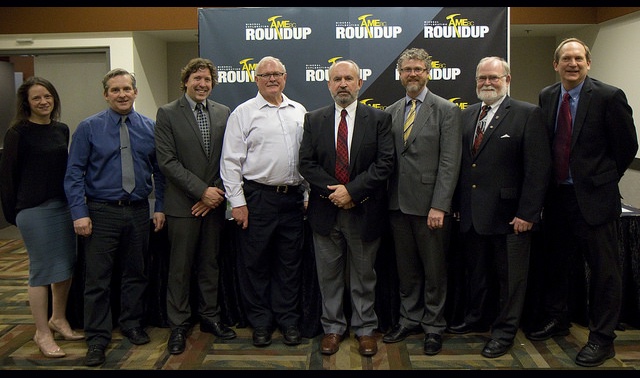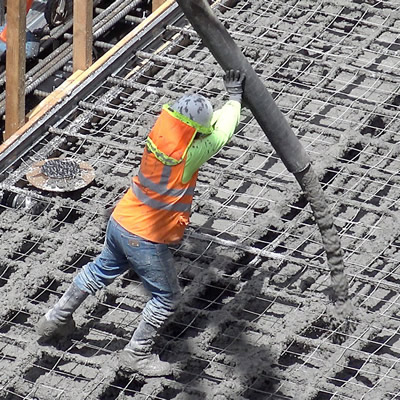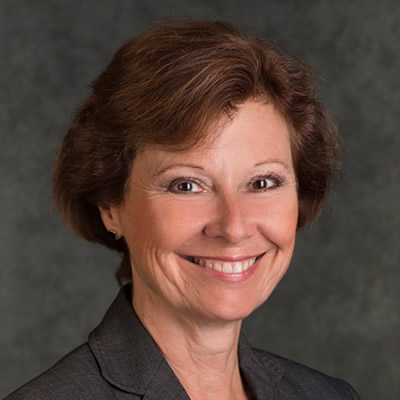New agreement brings mine training to Interior students
It's the first time students in north-central B.C. can enter the first year of the program and then transfer to BCIT afterward

MOU signing by six partners. — Photo courtesy of B.C. Government
A memorandum of understanding (MOU) was signed recently between the BC Centre of Training Excellence in Mining (CTEM) and five British Columbia post-secondary institutions that will make it easier for young people in B.C. to train for careers in mineral exploration and mining.
The agreement kicks off a pilot project called the Collaborative Mining Technology Diploma Pilot (CMT).
The pilot will give students the opportunity to complete up to one full year of the British Columbia Institute of Technology (BCIT) mineral exploration and mining technology diploma at the following institutions: The College of New Caledonia (CNC), Northwest Community College (NWCC), Okanagan College and Thompson Rivers University.
The CMT will provide math and sciences courses that are part of the core curriculum, and BCIT will look after the specialized courses in mining.
Successful completion of the CMT will enable students to transfer to Burnaby-based BCIT and complete either the two-year mineral exploration and mining technology diploma or the four-year mining and mineral resources engineering degree.
Students who start the diploma program and complete the first year are also eligible to transfer into BCIT's degree program.
“It gives students who don't live close to BCIT a foot in the door,” said Jan Jonker, CNC's interim associate dean for trades and technologies. “It's the first time our students in north-central B.C. can enter the first year of the program and then transfer to BCIT afterward.”
CNC, which has six campuses in the region (Prince George, Burns Lake, Fort St. James, Mackenzie, Quesnel and Vanderhoof), will offer the one-year program at its Prince George location.
Jonker said there is a lot of mining activity in northern B.C. and therefore plenty of job opportunities.
“There are five mines that are either coming online now or going through the approval process,” he said. “It will be good to have young people from the region working at them, because they are familiar with the topography and climate of northern B.C., unlike youth from, say, the Lower Mainland.”
Jill Tsolinas, executive director of CTEM, which is facilitating the project, said the MOU kicks off the first stage of the multi-stage pilot.
“The first stage, which will run until this August, is to confirm program delivery with all of the partners,” Tsolinas said. “The second stage, which will run from September 2016 until August 2017, is to pilot the first year delivery as a partnership.”
The third stage of the program (September 2017 to August 2018) is to evaluate Year 1 delivery and the transition into Year 2 as well as to incorporate any additional training organizations that are interested in taking part.
The participating post-secondary institutions will begin to accept applications in May 2016 for the September 2016 intake of the first students.
Tsolinas said the number of students who will be admitted to the pilot project will be determined during its first stage.
“Right now we expect to admit about 10,” she said.
Launched in 2013 and hosted by NWCC, CTEM is a province-wide virtual hub that connects the mining and mineral industries, communities and public post-secondary institutions throughout the province. Its purpose is to ensure students receive targeted training that will give them in-demand skills in mining and mineral exploration.
The announcement of the MOU was made at the recent Association for Mineral Exploration British Columbia (AME BC) Roundup in Vancouver.
Following the theme of innovation in exploration, Roundup 2016 covered such subjects as the importance of stakeholder engagement and effective relationship building. It also looked at creative and innovative approaches to mineral exploration and development in a challenging market.
More than 5,400 participants representing 33 countries attended Roundup.
In addition to the MOU announcement, B.C. Premier Christy Clark said the Province will extend the BC Mining Exploration Tax Credit and mining flow-through share program.
The government will also allow B.C. mines to defer electricity bills to provide relief to mining companies that are waiting for commodity markets to recover.
AME BC’s Mineral Exploration Roundup conference returns to the Vancouver Convention Centre East under the sails of Canada Place between January 23 and 26, 2017.




